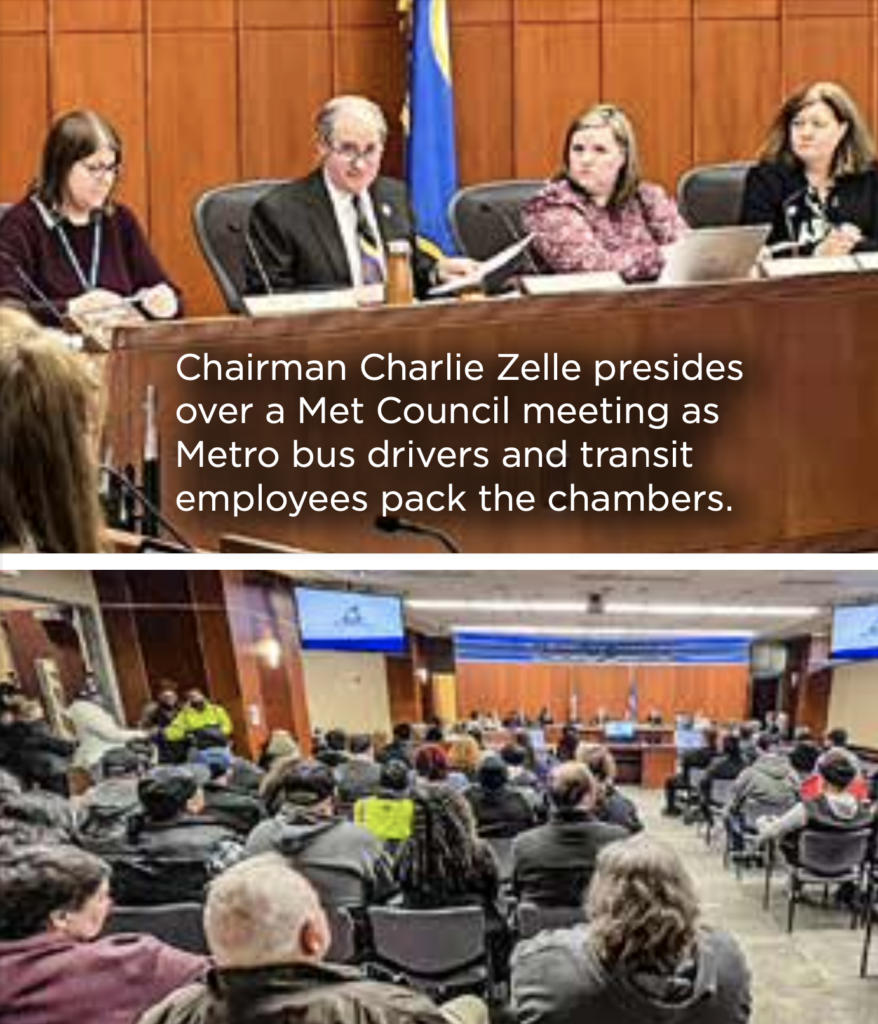Fast track to disaster
Walz doubles down on failure at the Met Council.
There’s no Minnesota nice way to put it. The Metropolitan Council runs the most crime-ridden, dangerous light rail transit system in the nation and the guy in charge, Chairman Charlie Zelle, appears to be way over his head in combating it.
Yet instead of seizing the opportunity at the start of a second term to bring accountability to the agency, appoint new leadership to crack down on Metro Transit crime and lure back gun-shy riders, Gov. Tim Walz doubled down, rewarding the loyal, long time DFL-insider Zelle.

“I am honored to reappoint Chair Zelle to the Metropolitan Council,” said Walz. “His deep understanding of transportation, infrastructure, and the growing needs of Minnesotans and our business community will continue to benefit the Metropolitan Council and the people it serves.”
The vote of confidence comes at a critical time with Metro Transit struggling to regain ridership post pandemic, stuck at roughly 50 percent of the customers that relied on public transit in 2019.
While accounting for just four percent of passenger miles on the 22 light rail systems nationwide in 2019, Metro Transit accounted for 40 percent of what the experts call “personal security events,” according to federal data in American Experiment’s newly released transportation report, “Off the Rails.” Personal security events occur when victims are injured during a ride.
It’s not only crime, but nuisance and threatening behavior that’s ravaging the rails. A Citizens League survey conducted for Met Council found 72 percent of passengers have safety concerns that affect how often they use the system. It states “there has been a sharp increase in disruptive behavior: weapons, firecrackers, smoking, drug use, foul language, sex, gender-based harassment, verbal abuse, urination, etc. These disruptive behaviors are impacting safety.”
Zelle asserts the safety of passengers and employees is his top priority. But you’d never know it from updates on the Met Council website. It didn’t make the cut in a recent chairman’s column on the importance of surveying transit riders about the agency’s new 2050 comprehensive plan in the making.
“On any given day, we might be asking people how they use regional parks, compiling an inventory of regional greenhouse gases, forecasting regional population, studying affordable housing production, and monitoring COVID-19 in our wastewater to track the spread of the virus,” Zelle wrote. “This is just a sample of the research the Met Council engages in.”
In a recent media appearance on TPT’s Almanac program, Zelle acknowledged the public safety threat to passengers, while seemingly downplaying some of the behaviors behind it.
“I think most of it is not dangerous. If you see people smoking on a car smoking pipes that’s disturbing, it’s not necessarily dangerous,” Zelle said. “Our number one priority is the safety and security for our passengers and our employees because if we don’t offer a welcoming, safe environment, nobody’s going to take our trains and buses. So we have to deal with it.”
Zelle insists the Met Council’s 40-point safety and security action plan will get the system back on track. It calls for more surveillance cameras, uniformed police, and community service officers. But it’s accomplished little thus far, further eroding the agency’s credibility. Crime shot up more than 50 percent on Metro Transit trains and buses in 2022 — a 28 percent rise in assaults, 145 percent more weapons and a 182 percent increase in drug violations.
“Here’s the one-point plan we need: people who are brazenly breaking the law will be arrested. Years ago, before the pandemic, under pressure from activists, we stopped enforcing basic rules on public transit,” wrote lifelong Minneapolis transit rider Nick Magrino in the Star Tribune.
“We stopped ticketing fare evaders. We started tolerating cigarette smoking. Once the pandemic began, we figured we may as well allow the ends of the cars to become opium dens. Some feel pretty good about this more enlightened approach; others are being shot and killed in broad daylight at train stations. Does anyone in a position to do anything about this care?”
Some 100 Metro Transit bus drivers and employees packed the Met Council chambers in February to make essentially the same point. “The public does not get told I would say even five percent of what goes on,” a bus driver of 12 years told me at the meeting. “Drivers are assaulted all the time.”
There may be no quick fix but American Experiment’s “Off the Rails” report suggests a practical starting point: “The main reason light rail is so attractive to potential criminals is the lack of rigorous fare enforcement. The solution is to put fences and turnstiles around every light-rail stop and not allow people inside unless they have paid their fares.”
Yet as of this writing, DFL lawmakers intend to pass legislation decriminalizing fare evasion with Charlie Zelle’s enthusiastic approval.